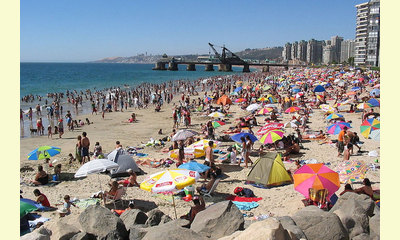|
|
UN agency welcomes General Assembly’s adoption of resolution on ecotourism
un article par United Nations News Centre (abridged)
The United Nations tourism agency today welcomed the General Assembly’s adoption of a resolution late last year which recognized ecotourism as key in the fight against poverty, the protection of the environment and the promotion of sustainable development.

Photo: G. Küppers (JordiCubero)
click on photo to enlarge
“UNWTO welcomes the adoption of this resolution on the importance of ecotourism,” said the Secretary-General of the UN World Tourism Organization (UNWTO), Taleb Rifai, in a news release.
“The remarkable support that the resolution has received, from all regions and across the development spectrum, is a clear testimony that sustainable tourism has a vital role to play in a fairer and sustainable future for all,” he added.
The resolution, adopted on 21 December and entitled ‘Promotion of ecotourism for poverty eradication and environment protection,’ calls on UN Member States to adopt policies that promote ecotourism, highlighting its “positive impact on income generation, job creation and education, and thus on the fight against poverty and hunger.”
It further recognizes that “ecotourism creates significant opportunities for the conservation, protection and sustainable use of biodiversity and of natural areas by encouraging local and indigenous communities in host countries and tourists alike to preserve and respect the natural and cultural heritage.”
According to UNWTO, the resolution – facilitated by Morocco and sponsored by a record 105 delegations – draws on the recommendations contained in one of its reports, put together on the basis of responses from 48 Member States, “which, in a notable departure from its normal practice, was welcomed by the UN General Assembly.”
In line with the UNWTO report’s recommendations, the resolution underscores the need for national tourism plans to account for market demand and local competitive advantages.
It also encourages Member States to promote investment in ecotourism, in accordance with their national legislation, including creating small and medium-sized enterprises, promoting cooperatives and facilitating access to finance through inclusive financial services such as microcredit initiatives for the poor, local and indigenous communities, in areas of ecotourism potential and rural areas. . .
Held in the Indian city of Hyderabad, the 11th meeting of the Conference of the Parties to the Convention on Biodiversity unveiled a strategy to combat unprecedented levels of biodiversity loss and called for “significant” increases in biodiversity investments in 100 countries – while at the same time aiming to foster economic growth and create jobs in addition to protecting endangered species and habitats. . .
Last year, the UNWTO said that despite global economic uncertainty, international tourism continued to grow in 2012, with the estimated number of tourists travelling that year reaching a record one billion.
Tourism accounted for nine per cent of global gross domestic product when totalling its direct, indirect and induced impact, according to the agency, which also noted that one in every 12 jobs and up to eight per cent of the total exports of the world’s UN-designated Least Developed Countries (LDCs) depend on tourism.
|








|
DISCUSSION
Question(s) liée(s) à cet article:
How can tourism promote a culture of peace?,
* * * * *
Commentaire le plus récent:
Why tourism?
Can tourism be seen as an instrument to achieve complicity between people’s minds?
“There is nothing better that connects two people’s mind than a good conversation” The above quote could be used to describe the effect which tourism has on people. Like a great conversation, tourism could be said to play a vital role amongst people all over the world. It fosters communication in all its senses, intercultural dialogue and mutual understanding.
In today’s world it is evident that there is a shortage of moral or ethical values amongst people across the different nations in this world, resulting in a globalised world lacking these morals and ethical values. Ignorance, the failure to consider the needs of others, and selfishness are a few of the ways which hinder us from embracing diversity and a common human perspective, which would result informal empathy, internal moral compassion, tolerance of differences, historical consciousness and interpretation. The above mentioned features are intrinsic, inherent and can be found in the practice of tourism.
Tourism has been emphasized as one of the most effective instruments which continue to tackle to tackle social and economical poverty, as well as encourage the culture of peace practice amongst people. In looking at the UN architecture, one is able to see the growing implications which the tourism sector has on the world and world policies. . ... continuation.

|
|









